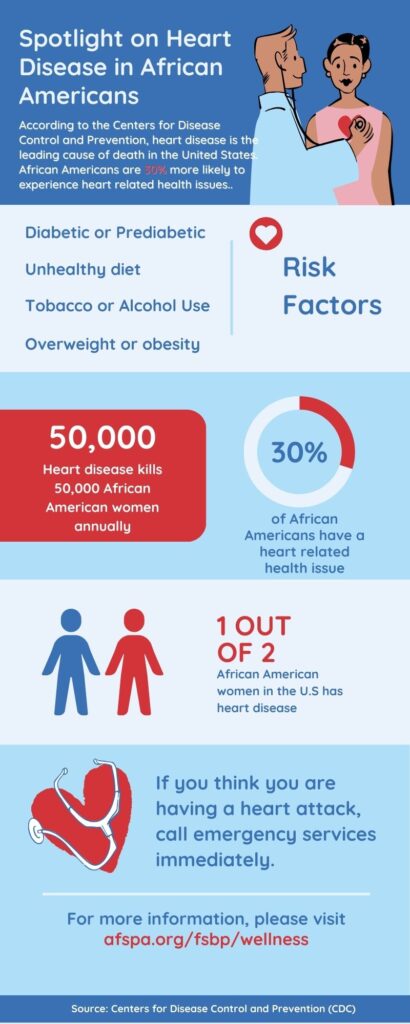
As February unfolds, it isn’t solely about the flowers, chocolate, gifts, and romantic dinners. It’s also a time to monumentalize Black History Month and American Heart Disease Month. While we honor the incredible achievements of African Americans throughout history, it’s an essential time to shine a spotlight on an issue close to many of our hearts, heart health.
 According to the Centers Disease Control and Prevention (CDC) , heart disease is the leading cause of death in the United States in both men and women. Additionally, African Americans are 30 percent more likely to face health related issues from heart disease than any other group of people. Although heart disease doesn’t discriminate based on race, its prevalence and severity vary among different demographic groups. African Americans have a higher risk of heart disease compared to other racial or ethnic groups in the U.S. Shockingly, nearly 48% of African American women and 46% of African American men over the age of 20 have some form of cardiovascular disease like; stroke, high blood pressure, angina (chest pain), and clogged arteries in the heart, arms, or legs.
According to the Centers Disease Control and Prevention (CDC) , heart disease is the leading cause of death in the United States in both men and women. Additionally, African Americans are 30 percent more likely to face health related issues from heart disease than any other group of people. Although heart disease doesn’t discriminate based on race, its prevalence and severity vary among different demographic groups. African Americans have a higher risk of heart disease compared to other racial or ethnic groups in the U.S. Shockingly, nearly 48% of African American women and 46% of African American men over the age of 20 have some form of cardiovascular disease like; stroke, high blood pressure, angina (chest pain), and clogged arteries in the heart, arms, or legs.
According to the CDC, African Americans are more likely to have high blood pressure, a major risk factor for heart disease, and often develop it at an earlier age than other racial groups. Moreover, conditions like sickle cell anemia, prevalent in African American communities, can further exacerbate cardiovascular complications as well as diabetes, high cholesterol, genetics, and obesity.
Additionally, there are other factors that contribute to these alarming statistics around African Americans with heart disease. Socioeconomic disparities, limited access to healthcare, and higher rates of obesity and diabetes are just a few of the challenges faced by many African Americans. Additionally, systemic racism and historical injustices have led to distrust of the healthcare system, resulting in delayed diagnosis and treatment.
Prevention is key to combating heart disease. Here are some steps individuals can take to protect their heart health:
This Black History Month let’s raise a glass to resilience, strength, and the power of community as we come together to also raise awareness for American Heart Disease Month. Together, we can rewrite the narrative on heart health and ensure that everyone has a seat at the table – or should we say, the dance floor? So, grab your dancing shoes and join the celebration. Because when we come together, there’s no limit to what we can achieve – heart disease, you’ve met your match!
Let us use this month not only to celebrate love but to raise awareness and take meaningful action towards building a healthier, more equitable future for all.
Stay heart-healthy, stay fun, and let’s keep the party going!
How AFSPA Can Help?
AFSPA’s Foreign Service Benefit Plan (FSBP) has multiple options to help you prevent heart disease. FSBP offers wellness rewards after completing preventive and healthy action items like taking your annual Health Risk Assessment (HRA) and getting an annual physical exam & biometric screening. You can earn $175 in wellness rewards just by getting these assessments done (FSBP members 18+.)
Don’t forget to check out other healthy action items where you can earn more wellness rewards. FSBP also provides special programs specifically for your heart health. Visit https://www.afspa.org/fsbp/wellness for more information.
Copyright © 2025 All Rights Reserved by AFSPA.